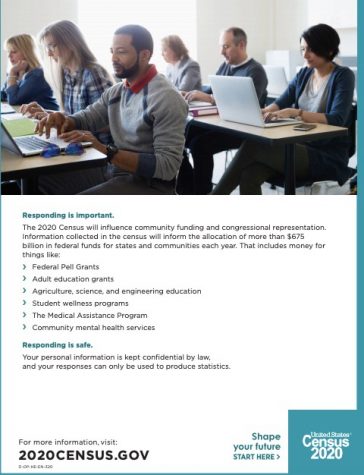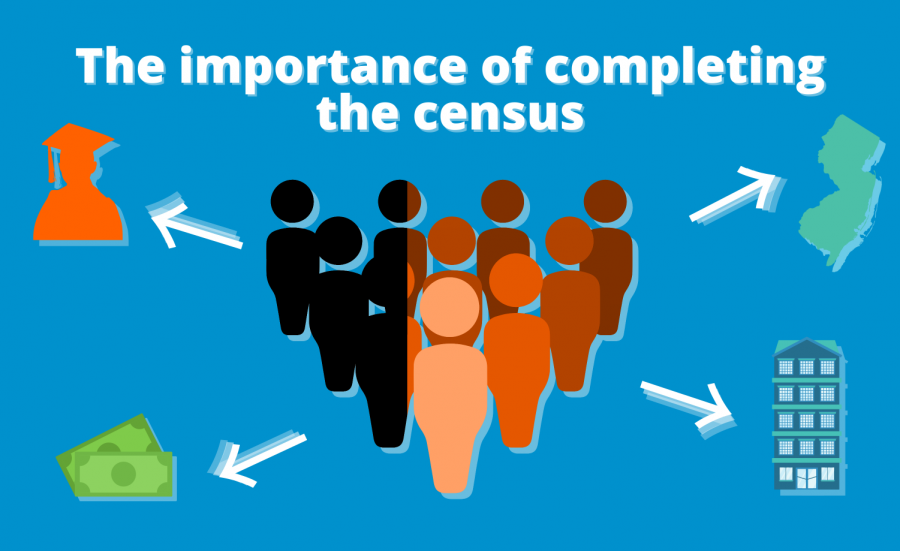The importance of completing the census
While minors cannot fill out a census form, census numbers and their accuracy can have huge implications on highschoolers, college students, and any person living in the United States.
Designed by Jared Mitovich
Among other things, the census determines what resources are sent to an area, such as during a natural disaster, and how much money is allocated to an area.
[Editor’s note: Riley Solomon is a student representative on the Montvale Diversity and Inclusion Committee, a new Committee tasked with working with the mayor and council on improving diversity issues in Montvale, informing residents of important matters surrounding diversity, and making all aspects of Montvale more diverse and inclusive.]
As high schoolers, you probably haven’t thought much about completing the national census, and maybe some of you aren’t even sure exactly what the census is. The census is the total number of people living in the country, and it is only counted every ten years. While minors cannot fill out a census form, census numbers and their accuracy can have huge implications on highschoolers, college students, and any person living in the United States, so if you are under 18 and your parents have not completed their census, make sure they do that soon. Here are some quick facts on what the census is and why everyone should complete it.
When is it due?
The 2020 Census is due September 30, 2020.
How does one fill it out?
Click here to fill out the form. It will ask some basic questions about where you live, how many people live in your house, and other demographics.
Why does one need to fill it out?
The census determines what resources are sent to your area, such as during a natural disaster, and how much money is allocated to your area. Forbes Magazine uses a helpful analogy that “if only 80 percent of people in your town are counted in the census, it will only get 80 percent of the funding that it needs for the next ten years.”
The census is also extremely important in politics, as it determines how many congressional seats a state has, which determines how many delegates each state gets in the Electoral College. So, if enough people don’t complete the 2020 Census, the stakes are as big as the next presidential election.
How does the census affect college students?
The census can determine how much money certain colleges are awarded, the mental health resources that can be given to colleges, and the amount that colleges are able to give away for grants. Here is a helpful infographic from census.gov:

Can non-American citizens complete the census?
Yes. There are no questions about citizenship on the census, and there are laws against the Census Bureau sharing individual census responses with anyone, including immigration enforcement.
Currently, about 80% of Montvale residents have completed their census, and it’s important to make that number as high as it can possibly be.
Hills senior Alyssa Linardic, a member of the newly-founded Montvale Diversity and Inclusion Committee emphasized the importance of completing the census, saying that “[it] is so simple; it takes ten minutes to complete. Ten minutes for ten years of government funding. The more accurate responses we get in, the more money that goes directly to fund our schools, hospitals, and public programs. It’s an easy way to help the community with minimal effort. Don’t waste the opportunity.”
If you have any questions about completing the census, contact the two student representatives on the Montvale Diversity and Inclusion Committee –– Riley Solomon ([email protected]) or Alyssa Linardic ([email protected]) –– or find more information at census.gov.

Riley is a senior and is so excited to be in her fourth year on the Trailblazer Staff! Riley has served as both the In-Depth Editor and College Corner editor, and is now thrilled to lead the Trailblazer Team as Co-Editor-In-Chief!
Fun Fact: Riley has memorized every episode of Glee.











































